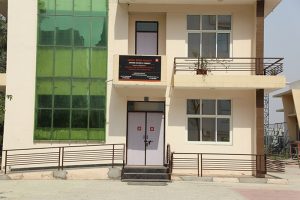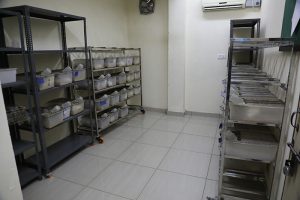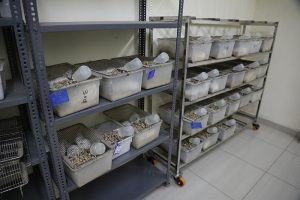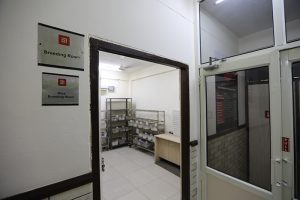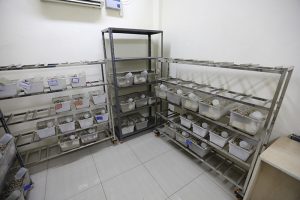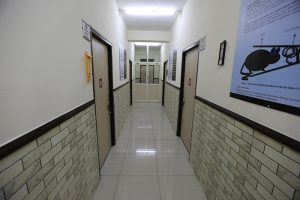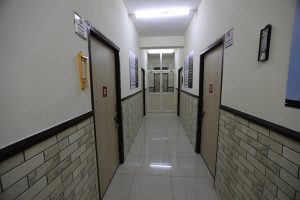CCSEA Reg. No.: 1181/PO/ReRcBi/S/08/CCSEA
Chitkara Small Animal House Facility (CSAHF), housed within Chitkara College of Pharmacy, Chitkara University, Punjab, is a state-of-the-art, CCSEA-registered (since 2008) research facility designed to support high-quality biomedical research and training. The facility complies fully with the Committee for the Control and Supervision of Experiments on Animals (CCSEA), Ministry of Environment, Forest & Climate Change, Government of India, for the purpose of education, research, and breeding of small laboratory animals for in-house use.
Key Features of CSAHF:
- Modern Infrastructure: A dedicated three-story building designed with a two-way corridor system to prevent cross-contamination.
- Controlled Environment: Maintains optimal conditions for animal welfare — temperature (23±3°C), humidity (60±10%), and a 12:12 h light-dark cycle, adhering to CCSEA norms.
- Full-Time Veterinarian & Skilled Staff: A qualified veterinarian ensures 24/7 healthcare for the animals, supported by trained attendants for cleaning, sterilization, and day-to-day maintenance.
- SOP-driven Operations: Adopts Good Laboratory Practices (GLP) with well-documented Standard Operating Procedures for all facility operations.
Facility Layout and Equipment
- Ground Floor – Dedicated to breeding, quarantine, and housing of various species such as mice, rats, guinea pigs, and rabbits in separate ventilated rooms.
- First Floor – Designed for preclinical behavioral studies, equipped with:
- Morris Water Maze
- Digital Elevated Plus Maze
- Tail Suspension Test
- Hole Board Test
- Isoflurane anesthesia chamber
- CO₂ euthanasia chamber
- Behavioral tracking using MazeMaster software
- Second Floor – Facilitated for biochemical and surgical research, including:
- Stereotaxis Instrument
- Autoclave, ELISA Reader
- Randall-Selitto Analgesimeter
- Cooling Centrifuge
- Non-invasive Blood Pressure Monitoring System
- Tonometer
- BS2 Level Lab
- -18°C Biomedical Refrigerator
- Dedicated Rooms for:
- Research laboratories (4)
- Animal experimentation (species-wise segregation)
- Quarantine and breeding
- Feed and water storage
- Washing and sterilization
- Biomedical waste and carcass disposal (via MoU with Rainbow Environments Pvt. Ltd.)
Major Research Areas Supported
Chitkara College of Pharmacy leverages CSAHF to foster multidisciplinary research across various domains of biomedical sciences, including:
- Neuropharmacology & CNS Disorders:
- Parkinson’s Disease, Alzheimer’s Disease, Huntington’s Disease
- Stress-induced depression, anxiety, substance addiction
- Traumatic brain injury, cerebral ischemia-reperfusion injury
- Metabolic & Inflammatory Disorders:
- Obesity, Diabetes Mellitus, Renal and Liver injury
- Rheumatoid arthritis and systemic inflammation
- Drug Screening & Behavioral Neuroscience:
- Evaluation of psychoactive compounds
- Memory, learning, cognition, and analgesia studies
Institutional Animal Ethics Committee (IAEC)
The CSAHF operates under a fully functional IAEC, registered with CCSEA, which meets biannually (minimum) to review and approve research protocols, ensuring strict ethical compliance.
Member

Chairperson and Member Secretary (IAEC)
Dean, Chitkara College of Pharmacy
Chitkara University, Punjab
Email: dean.ccp@chitkara.edu.in, gurjeet.singh@chitkara.edu.in
Mobile: +91 98159 51171
IAEC Composition
| S.No. | Name | Designation |
| 1 | Dr. Thakur Gurjeet Singh | Chairperson |
| 2 | Dr. Harmel Singh | Main Nominee, CCSEA (Nominated by CCSEA) |
| 3 | Dr. Pradeep Goyal | Link Nominee, CCSEA (Nominated by CCSEA) |
| 4 | Dr. Vikas Rana | Scientist from Outside Institute (Nominated by CCSEA) |
| 5 | Dr. Amit Goyal | Socially Aware Nominee (Nominated by CCSEA) |
| 6 | Dr. Amarjot Kaur | Member Secretary |
| 7 | Dr. Anoop Sahu | Veterinarian |
| 8 | Dr. Samrat Chauhan | Scientist from Different Discipline |
| 9 | Dr. Amit Kumar | Scientist from Different Discipline |
Objectives of IAEC (As per CCSEA and Best Practices)
Ensure ethical and humane use of animals in education, research, and testing in accordance with the Prevention of Cruelty to Animals Act, 1960.
- Review and approve all experimental animal use protocols to ensure that they are scientifically justified and ethically sound.
- Promote the 3Rs Principles:
- Replacement of animals with alternative methods where feasible.
- Reduction in the number of animals used to the minimum required for meaningful results.
- Refinement of experimental procedures to minimize pain, suffering, and distress.
- Facilitate responsible scientific research that contributes meaningfully to biomedical knowledge, drug development, and public health, while safeguarding animal welfare.
- Ensure species-specific and environmentally controlled housing, feeding, and veterinary care in compliance with CCSEA standards.
- Supervise and monitor the implementation of approved protocols, including mid-study audits and surprise inspections.
- Evaluate the competency and training of investigators and staff involved in animal experimentation.
- Encourage ethical awareness among researchers and students through periodic sensitization programs and workshops.
- Maintain detailed documentation and records of all protocols reviewed, decisions taken, animal usage statistics, and reports to be submitted to CCSEA.
- Regularly inspect the animal facility for hygiene, structural integrity, and operational compliance with CCSEA guidelines.
- Provide recommendations for corrective actions in cases of protocol deviation, welfare compromise, or non-compliance.
- Promote development and adoption of modern alternatives to animal experiments, including in vitro, in silico, or computational modeling approaches.
- Foster inter-institutional collaboration and facilitate partnerships for multi-disciplinary research projects involving ethical animal use.
- Ensure transparent and ethical disposal of animal carcasses and biomedical waste, in accordance with national regulations.
- Support continuous improvement in facility standards, based on feedback, audits, and evolving scientific and ethical standards.
Contact Us
Dr. Thakur Gurjeet Singh
Scientist In-charge, CSAHF & Chairperson, IAEC
Assistant Dean & HOD,
Chitkara College of Pharmacy
📞 +91-9815951171
📧 iaec.ccp@chitkara.edu.in

